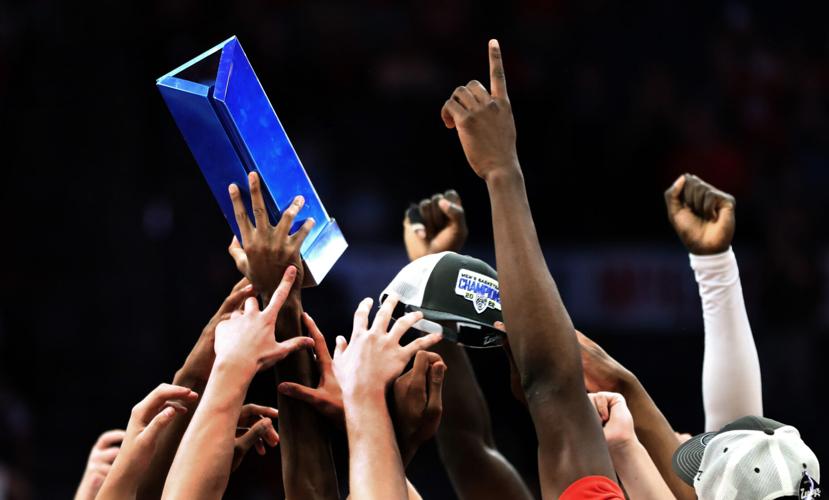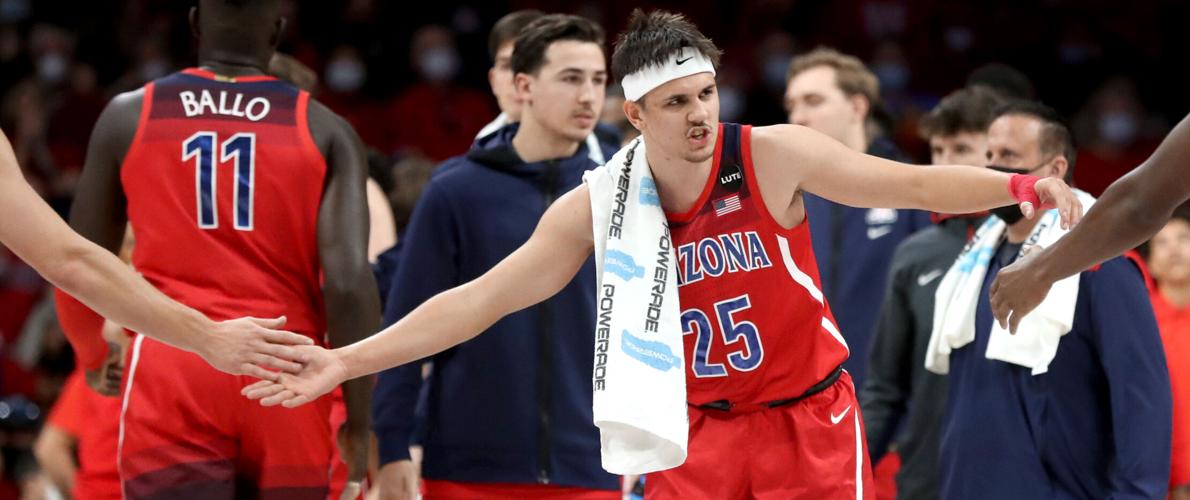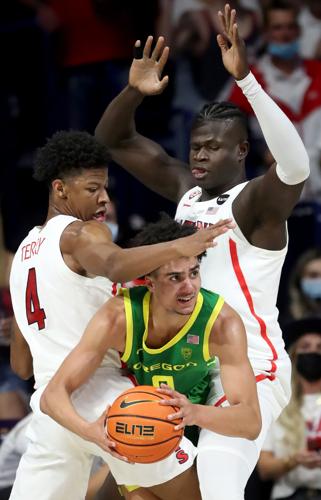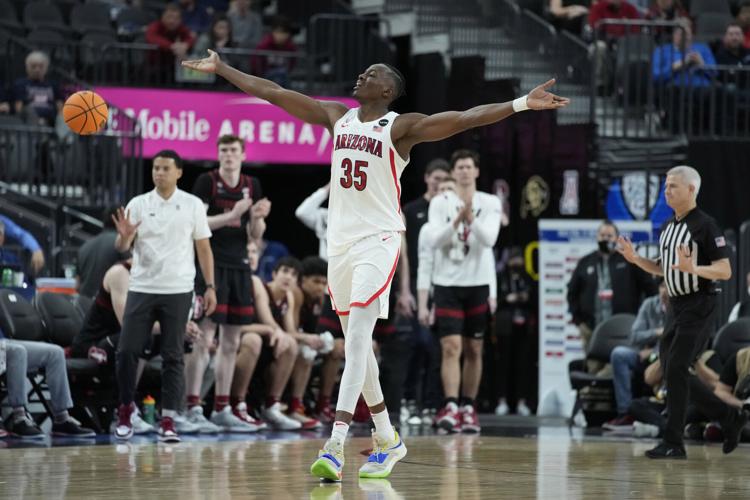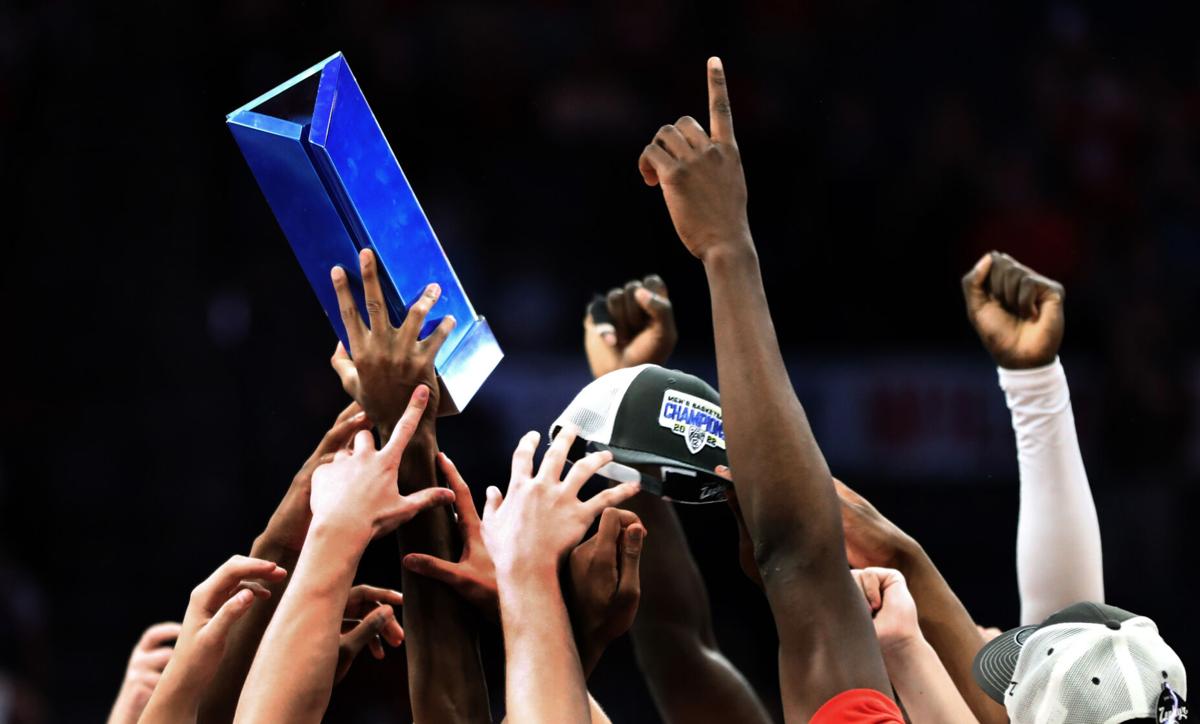Editor's note: This story appears in the Star's NCAA Tournament preview section, which you can read in its entirety by clicking here.
During their unexpected, joyful romp through the regular season, the Arizona Wildcats displayed a little bit of everything that can get a team to the Final Four.
They have pro prospects at every position, led by surefire NBA first-rounder Bennedict Mathurin. A fearless point guard, Kerr Kriisa. Glue, energy and athleticism from wing Dalen Terry. A power forward double-double machine in Azuolas Tubelis. The luxury of two 7-footers, one in Christian Koloko who can both protect the rim and defend perimeter players.
And a tight group of reserve players to fill every niche: Oumar Ballo, the physical other half of the 7-foot duo; versatile two-way tool Pelle Larsson and Justin Kier, the super senior combo guard.
They love to run, and they love to defend. They’re connected, resilient and tough.
It is all mixed together with chemistry unseen around Arizona in years, maybe even decades — thanks at least in part to ever-relatable first-year coach Tommy Lloyd.
“What is pretty special about them is their spirit,” says Pac-12 Networks analyst Matt Muehlebach, a former Wildcat standout and Tucson attorney. “It’s how they play together. The fun way they play. The fun they have together, the way they share the ball, share each other’s moments. It’s really high-level.”
Although they aren’t exceptionally deep and have basically zero NCAA Tournament experience, the Wildcats otherwise don’t really have any glaring weaknesses.
“Arizona is so good in transition. Their big guys are good. Mathurin is a pro,” ESPN analyst Jay Bilas said just before calling the Wildcats’ Pac-12-clinching win at USC on March 1. “As long as they stay healthy, they can beat anybody.”
But Bilas also said nobody this season, not even Arizona, is one of those “power teams” destined for a long NCAA Tournament run.
Plus, it’s March. Nothing is for sure. Anyone can get sent home at any time.
“There’s nobody out there that can’t lose in the Sweet 16,” Bilas said. “There’s probably eight teams — Arizona is one of them — that are in the top tier. But that doesn’t mean that they’re guaranteed past the Sweet 16.”
The top tier of teams that can win it all. Lloyd’s heard that one before.
He chuckled when asked about it Sunday at a press conference held just after the Wildcats were handed the No. 1 South Region seed and a tournament path that begins in San Diego this weekend.
“We got a roomful of experts here. What do you guys think?” Lloyd said, smiling. “I mean, listen, it’s hard to say. Obviously, there’s a group of teams that have maybe separated themselves and physically they look the part, and I think we’re in that group. But there is a lot of parity and you look at all these games and they’re gonna be tough. I’ve been in these 1-16 games and they’re tough. These teams seeded 14-15-16, they just won their conference tournament, and they’re feeling really good about themselves.”
Then, Lloyd said, being a No. 1 seed facing the winner of an 8-9 game in the second round isn’t easy either, because those 8-9 seeds are often talented power-conference teams.
Lloyd’s been there to coach a No. 1 seed, having spent 22 years on the Gonzaga staff before taking over the Wildcats last spring, but his current players have not.
The Wildcats have played a collective eight minutes in the NCAA Tournament. All of those belong to Ballo, who played briefly in three tournament games last season as a lightly-used backup center at Gonzaga.
The Wildcats’ sophomore core might have picked up some NCAA Tournament experience last season had the UA not decided to self-sanction out of the postseason because of its still-ongoing NCAA infractions case, and Koloko would have in 2019-20 had the coronavirus pandemic not surfaced.
Ballo was asked if he had any advice as the “veteran” of the postseason.
He smiled but expressed nothing but confidence.
“I think these guys are mature,” Ballo said. “We have a lot of mature guys on the team and we know what this means to us. There’s a lot of guys on the team that have never been to NCAA Tournament so this is special for them and there’s no way we’re gonna take this for granted. This is an opportunity we get with both hands and we are excited about it.”
That’s the way they’ve behaved all season, really.
Excited.
Unranked in the preseason and picked to finish in a fourth-place tie with Oregon State in the Pac-12, Arizona began by blowing away three low-major opponents at McKale Center, then went to Las Vegas for the Main Event mini-tournament, beating Wichita State in overtime and then-No. 4 Michigan in the final.

Arizona’s Christian Koloko celebrates after beating Stanford in the Pac-12 quarterfinals last week.
“We always talk about swag,” Lloyd said after the Michigan win, having changed his shirt after the first of several locker-room water baths this season. “Our Arizona swag is confidence but it’s backed up with intelligence and effort.”
They kept showing it even on the road in December, edging Illinois at Champaign but losing a four-point game at Tennessee. Then they managed to keep their momentum when an avalanche of Pac-12 COVID-19 pauses left them with just one game over three weeks around New Year’s.
They finished 18-2 in league play with three guys on the all-league team — Mathurin, Koloko and Tubelis — while Terry received multiple recognitions of his do-everything “glue” status.
Working games around the league and as a studio analyst in San Francisco all season, Muehlebach watched it all play out.
“The first thing that just jumps out is just their talent,” Muehlebach said. “They’re very talented, and that talent has developed. It feels like every guy on that team is better today than he was on Nov. 1.
“Their length is really impressive. When you see them live, it’s almost like the old baseball quote — the closer you get to home plate, the harder it is. The more I see them live and see them up close, their length and their athleticism really jumps out.”
They had elements of all this last season, when the five current starters played under then-coach Sean Miller, but four of them were freshmen and Koloko was a sophomore playing a big role for the first time without NBA first-round pick Zeke Nnaji around. Plus, Miller and point guard James Akinjo were running a different show schematically.
“They play a different style and the guys are not afraid to make a mistake,” Bilas said. “I think last year they played kind of afraid to make mistakes. And they’re a little bit more wide open the way they play.
“They defend differently. They’re not playing that pack-line but they adjust really well to things. They’ll play off of a nonshooting big and deny. They can press a little bit. They’ve got shot-blocking and their big guys are mobile so they can play small or they can play super big.”

Arizona’s Dalen Terry, left, and center Oumar Ballo trap an Oregon defender during their Feb. 19 game.
That flexibility helped Arizona win games a number of different ways all season, and could also help them match up with just about any sort of team they might face in the NCAA Tournament.
Got imposing bigs? Arizona can throw out Koloko and Ballo in a twin-tower format, with Koloko available to switch out on perimeter guys.
Trying to create mismatches with your hybrid forwards? Arizona can put Larsson on them and move Tubelis to the bench. At times, even Mathurin will hit the bench with Tubelis, as he did at the end of UA’s home win over UCLA and toward the end UA’s Pac-12 Tournament quarterfinal win over Stanford.
The final seconds and the celebration of Arizona 84-76 Pac-12 Tournament Championship over UCLA.
In UA’s 84-80 win over Stanford, Lloyd took Mathurin and Tubelis out with 2:45 left and UA leading just 76-75, then put Mathurin back in with 32 seconds left.
“We are a team and Benn’s a heck of a player,” Lloyd said after the Stanford game. “Defensively, we had a lineup that I felt really good about. I’ve got to make tough decisions sometimes and we had a defensive unit out there that I felt was best and I felt like we’re gonna have to get stops to win the game.
“Luckily, some of the calls we’ve made worked down the stretch.”
A day later, Lloyd rode Tubelis heavily en route to an 82-72 win over Colorado that avenged a 79-63 loss at Boulder just 13 days earlier, with the Lithuanian big man collecting 20 points and 11 rebounds. Then Lloyd subbed out for the final 1:09, inserting Larsson to protect what was then a 12-point lead.
Colorado wound up shooting just 38.7% from the field and took 15 fewer free throws than Arizona, exasperating Buffaloes coach Tad Boyle.
“Tubelis in the first half was terrific,” Boyle said. “What makes Arizona so dangerous is (against Stanford) Koloko has 24 and tonight he has eight — but they get five guys in double figures. They’re very well-balanced and have a lot of different weapons. They don’t rely on just any one guy.”
After a game when Colorado standout center Evan Battey had just 10 points, Boyle went on to rave about UA’s post defense, how the Wildcats are physical even before they catch the ball.
“They’re very well-coached in that regard,” Boyle said. “They got to the foul line 25 times and we got 10 times. I’m not complaining. I’m just talking about what I see here. We weren’t good. But they’re terrific. Their bigs are terrific.”
Arizona also proved during the Pac-12 Tournament that its guards are pretty versatile and durable, too.

Arizona guard Kerr Kriisa hands out high-fives during a timeout in the Wildcats’ win over ASU earlier this season.
Kriisa went down with what appeared to be an ankle sprain in the final minute of the Wildcats’ win over Stanford, pushing Kier into the starting lineup. But in the championship game against UCLA, Kier and Larsson both picked up three first-half fouls.
That’s when Terry responded with four assists and no turnovers, and Mathurin dished another five assists with two turnovers.
“DT JUST TOOK MY JOB,” Kriisa tweeted just after the Wildcats beat UCLA 84-76.
The Wildcats were Pac-12 champions again, having won both the regular-season and tournament titles.
They did it with flexibility and resiliency, two traits that could help them throughout this weekend in San Diego, then possibly during Sweet 16 and Elite Eight games next weekend at San Antonio and, just maybe, in the Final Four the following weekend in New Orleans.
After his Wildcats watched the NCAA tournament selection show together on Sunday afternoon, Lloyd reminded them of what they did, how they did it … and how they can keep doing it for three more weeks.
“I just basically told them ‘Congrats, and let’s use the experience from the Pac-12 Tournament as a great learning tool,’” Lloyd said. “Those were three hard-fought games and any one of those games could have went the other direction.
“But these guys find a way and that’s what you have to do in tournament basketball. Sometimes, you just have to kind of roll up your sleeves and find a way.”


